Difference between revisions of "Looseness"
| Line 5: | Line 5: | ||
==Loosenes - Loose grain leather== | ==Loosenes - Loose grain leather== | ||
| − | + | Loosenes or loose grain is leather were its grain layer is of irregular thickness and density. On a strong affected leather, this irregularity is so pronounced that the leather surface can be moved with the finger against the lower leather layers and gets an excessively wrinkly appearance when folded. | |
| − | + | Causes are fat deposits in the animal [[Hide - Skin|skin]], which dissolve during [[leather production|tanning]] and leave cavities. The hides of [[Sheep leather|sheep]] and [[Lamb leather|lamb]] are particularly susceptible to looseness. | |
| − | + | ||
| − | + | ||
| Line 16: | Line 14: | ||
</p> | </p> | ||
<p align=center> | <p align=center> | ||
| − | '' | + | ''In case of loose-grain leathers, the fibre braid is loose under the grain layer. Cow leather with fingernail pulled apart.''</p> |
| − | + | But [[cow leather]] is also affected. Normally, such hides are sorted out in [[leather production|production]]. Reasons for the loose grain of bovine leather are the breeds of the cattle (crossroads are more susceptible), the nutrition (fatty fodder) or an interruption of the [[Preservation by drying, salting or freezing|cooling process]] of the untanned skin. The fat in the skin then spoils and weakens the fibres. | |
| − | + | The main problem with bovine leather is the "loose-grained effect". This occurs when the applied [[finish|colour layer (pigmentation)]] is firmer than the softer leather underneath. The colour layer floats on the soft leather layer and unwished wrinkles get visible. | |
| Line 35: | Line 33: | ||
</p> | </p> | ||
<p align=center> | <p align=center> | ||
| − | '' | + | ''Typical cases of loosenes.''</p> |
| Line 43: | Line 41: | ||
</p> | </p> | ||
<p align=center> | <p align=center> | ||
| − | '' | + | ''Loosenes is not necessarily distributed throughout the complete skin.''</p> |
| Line 53: | Line 51: | ||
</p> | </p> | ||
<p align=center> | <p align=center> | ||
| − | '' | + | ''Both cross-sections are from the same skin. The different fibre structures are easy to recognize. The loose grain is in the region of the thicker fibre bundles.''</p> |
| Line 65: | Line 63: | ||
</p> | </p> | ||
<p align=center> | <p align=center> | ||
| − | '' | + | ''This [[car leather|car head support]] shows very different wrinkles within a small area. The leather is more loose in the margins. With a headrest, this is not necessarily a [[leather quality|quality deficiency]].''<br></p> |
<p> </p> | <p> </p> | ||
| Line 72: | Line 70: | ||
== Additional information == | == Additional information == | ||
| − | * [[ | + | * [[Leather damages]] |
| − | * [[ | + | * [[Natural markings on leather]] |
| − | * [[ | + | * [[Leather defects]] |
Revision as of 14:20, 31 January 2017
Loosenes - Loose grain leather
Loosenes or loose grain is leather were its grain layer is of irregular thickness and density. On a strong affected leather, this irregularity is so pronounced that the leather surface can be moved with the finger against the lower leather layers and gets an excessively wrinkly appearance when folded.
Causes are fat deposits in the animal skin, which dissolve during tanning and leave cavities. The hides of sheep and lamb are particularly susceptible to looseness.
In case of loose-grain leathers, the fibre braid is loose under the grain layer. Cow leather with fingernail pulled apart.
But cow leather is also affected. Normally, such hides are sorted out in production. Reasons for the loose grain of bovine leather are the breeds of the cattle (crossroads are more susceptible), the nutrition (fatty fodder) or an interruption of the cooling process of the untanned skin. The fat in the skin then spoils and weakens the fibres.
The main problem with bovine leather is the "loose-grained effect". This occurs when the applied colour layer (pigmentation) is firmer than the softer leather underneath. The colour layer floats on the soft leather layer and unwished wrinkles get visible.
Typical cases of loosenes.
Loosenes is not necessarily distributed throughout the complete skin.
Both cross-sections are from the same skin. The different fibre structures are easy to recognize. The loose grain is in the region of the thicker fibre bundles.
This car head support shows very different wrinkles within a small area. The leather is more loose in the margins. With a headrest, this is not necessarily a quality deficiency.
Additional information








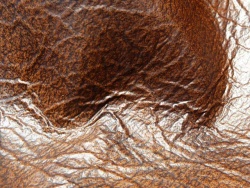
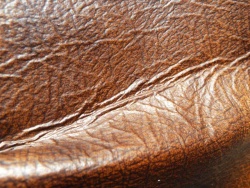
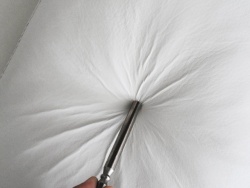
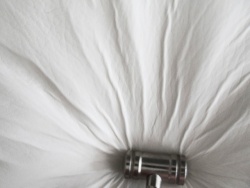
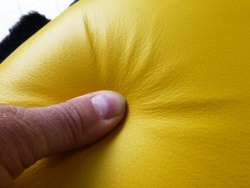
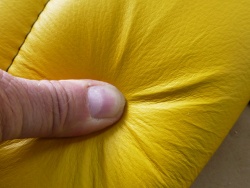







 a kotori web solution
a kotori web solution